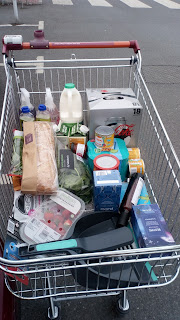As part of our CSR initiative for World Environment Day to #BeatPlasticPollution Horwich Farrelly will be asking employees to take a plastic free challenge - eliminating as much plastic from their lives as possible and documenting their journey in a creative way.
The prize is spectacular - a week volunteering on a beach conservation project in Belize for 2 people. Unfortunately I can't enter the competition or win, but I was excited to experiment with the concept and see whether we as a family could go plastic free for a week.
As sustainability professional, I've been aware of the plastic challenge for over a decade and as a family we've done a small amount to avoid plastic where possible - we don't purchase many plastic toys for the children, we never buy plastic carrier bags, we re-use old plastic tubs to store toys/ use for crafting, we avoid providing the classic plastic party bags full of cheap plastic toys, we use paper straws and cups for parties, we take packed lunches to avoid pricey over packaged shop bought lunches, we cook from scratch where possible and we grow some of our own fruit and vegetables.
Conscious that we're still not doing enough, since the beginning of 2018, we're been been making a monthly plastic pledge to eliminate one unnecessary plastic thing each month - hand soap dispensers in plastic bottles, switching to washing powder in a box rather than liquid in a bottle, swapping shop bought body scrubs (with potential micro beads) for home made salt scrubs and investing in some plastic free chewing gum.
But we both work, we have three children under the age of 5, we shop for convenience, we used disposable nappies for all the kids, we still have a wet wipe dependence we can't shake and we know we could do better. So when the opportunity to trial this challenge came up, we jumped at the chance. It should be challenging and we can't get rid of plastics completely but bringing the issue to the forefront of our minds will be a great way to think about the changes we can make day to day.
My first step in preparation was to look at a typical trolley after "popping to the supermarket for a few bits" and categorising into plastic and non plastic (plastic on the left, non plastic on the right)
So straight away, one small trolley load and I'm gob smacked by how much plastic we consume without even really thinking about it.
I've never previously questioned the plastic window on fresh bread before - but that seems very unnecessary! The soup cartons sit on the plastic side based on their lids, and tetra-pak is recyclable, but it still contains plastic lining similarly to coffee cups. The fruit and veg seems to be the biggest issue here - as a family we eat pretty healthily, but fruit punnets, salad bags, bags of apples etc are all packaged for convenience.
Our environmentally sound house cleaning products still come in plastic bottles, although Method have considered the plastic life cycle of their products and the bottles are all made from recycled plastic and fully recyclable.
On closer inspection, I've incorrectly categorised my multi pack tins. Again, something I've never even thought about. The multi packs work out cheaper to buy - but are covered in plastic to keep them together.
A big plastic purchase here is the dustpan and brush. I wasn't thinking at all - you can buy metal dustpan easily. BUT even if I had been thinking, some online research shows a price tag of £15-£20 - as opposed to my plastic traitor that came in at £3.
So my trolley load started me thinking about the terms of this plastic free challenge. How seriously are we going to take it? Could we cut out all plastic? What do we mean by single use? Are the plastics recyclable? Are they reusable?
The terms of our challenge
1. Try to eliminate entirely all pointless plastic: plastic straws, coffee cups, fruit and veg wrapped in plastic (especially if they have their own skin), single use bottles or packaging, wet wipes(gah!)
2. Consider all plastics that aren't "single-use" but that have a short use phase: shampoo, toothbrushes, food containers like ice cream tubs.
3. Try and replace plastics that have alternatives: plastic bags, cotton buds, make up and beauty products, chewing gum
4. Don't throw anything away! For the duration of our plastic free challenge, I'll be hiding some of the bottles and products that we use daily to give us an idea of what we're aiming for, but I'll use them up once the challenge is over.
5. Think more about reusing plastics - a drinks bottle might be designed for a single use, but can we use them again and extend their life span?
There are some really useful resources online to help thinking about plastic consumption and what can be done to reduce your footprint - I'll be reading up on these and getting some ideas this week in advance of the challenge!
http://globalgoodawards.co.uk/pointlessplastics/
https://myplasticfreelife.com/plasticfreeguide/
http://www.pfree.co.uk/
https://www.theguardian.com/environment/2018/jan/17/is-it-possible-to-live-without-plastic-readers-tips-for-for-tip-free-living

No comments:
Post a Comment